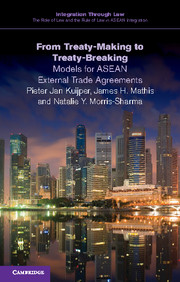Book contents
- Frontmatter
- Contents
- General editors' preface
- List of abbreviations
- 1 Introduction
- 2 Substantive components of an ASEAN trade agreement from an external perspective
- 3 Moving forward: different institutional models for ASEAN's external trade agreements
- 4 The rules on dispute settlement in agreements between ASEAN member states and third states: a critical inventory
- 5 From treaty-making to treaty-breaking
- Executive summary
- Appendix 1 Agreements signed by ASEAN member states with a non-ASEAN party
- Appendix 2 ‘Non-ASEAN’ agreements
- References
- Index
1 - Introduction
Published online by Cambridge University Press: 05 April 2015
- Frontmatter
- Contents
- General editors' preface
- List of abbreviations
- 1 Introduction
- 2 Substantive components of an ASEAN trade agreement from an external perspective
- 3 Moving forward: different institutional models for ASEAN's external trade agreements
- 4 The rules on dispute settlement in agreements between ASEAN member states and third states: a critical inventory
- 5 From treaty-making to treaty-breaking
- Executive summary
- Appendix 1 Agreements signed by ASEAN member states with a non-ASEAN party
- Appendix 2 ‘Non-ASEAN’ agreements
- References
- Index
Summary
Why this study?
The Association of Southeast Asian Nations (ASEAN) is an unusual international organisation in full development. It started out as a regional organisation devoted to preventing conflict between its members; a fear fed by Indonesia's so-called ‘konfrontasi’ policy in the 1960s. It soon developed in the direction of a free trade area fostering economic cooperation between its members. With these objectives and their interrelationship, ASEAN might well have looked to the European Communities (EC) as a model. But the organisation and its members have always maintained that ASEAN must find its own way to economic integration as a barrier against internecine conflict. Hence, ASEAN has remained an ‘international-organisation-lite’, primarily directed by deliberative bodies of the members and having only weak organs of a purely international character, such as a secretariat.
This situation has made for very interesting developments in the external relations of ASEAN. In spite of the organisation's lack of a treaty-based personality, international agreements, especially in the field of trade and economic cooperation (by far the largest category of ASEAN's international agreements), have been created in ever-increasing numbers over the last decade. These agreements have been concluded by the governments of the member states acting together, as so-called plurilateral agreements, with one or more third states. The most important category of these agreements consists of trade liberalisation agreements or full free trade agreements, (FTAs) in line with the worldwide trend of having recourse to such agreements in the absence of serious progress in the World Trade Organization's (WTO) Doha Development Agenda. It is these agreements that are the primary subject of this study.
The study begins with asking whether ASEAN trade agreements follow worldwide trends as far as the substantive content of such agreements are concerned, in particular whether the tendency towards including more and more so-called ‘behind the border’ subjects is also followed by ASEAN. This is indeed the case, just as the inclination to include robust provisions on dispute settlement is also based on international practice in relation to free trade area agreements.
- Type
- Chapter
- Information
- From Treaty-Making to Treaty-BreakingModels for ASEAN External Trade Agreements, pp. 1 - 19Publisher: Cambridge University PressPrint publication year: 2015

